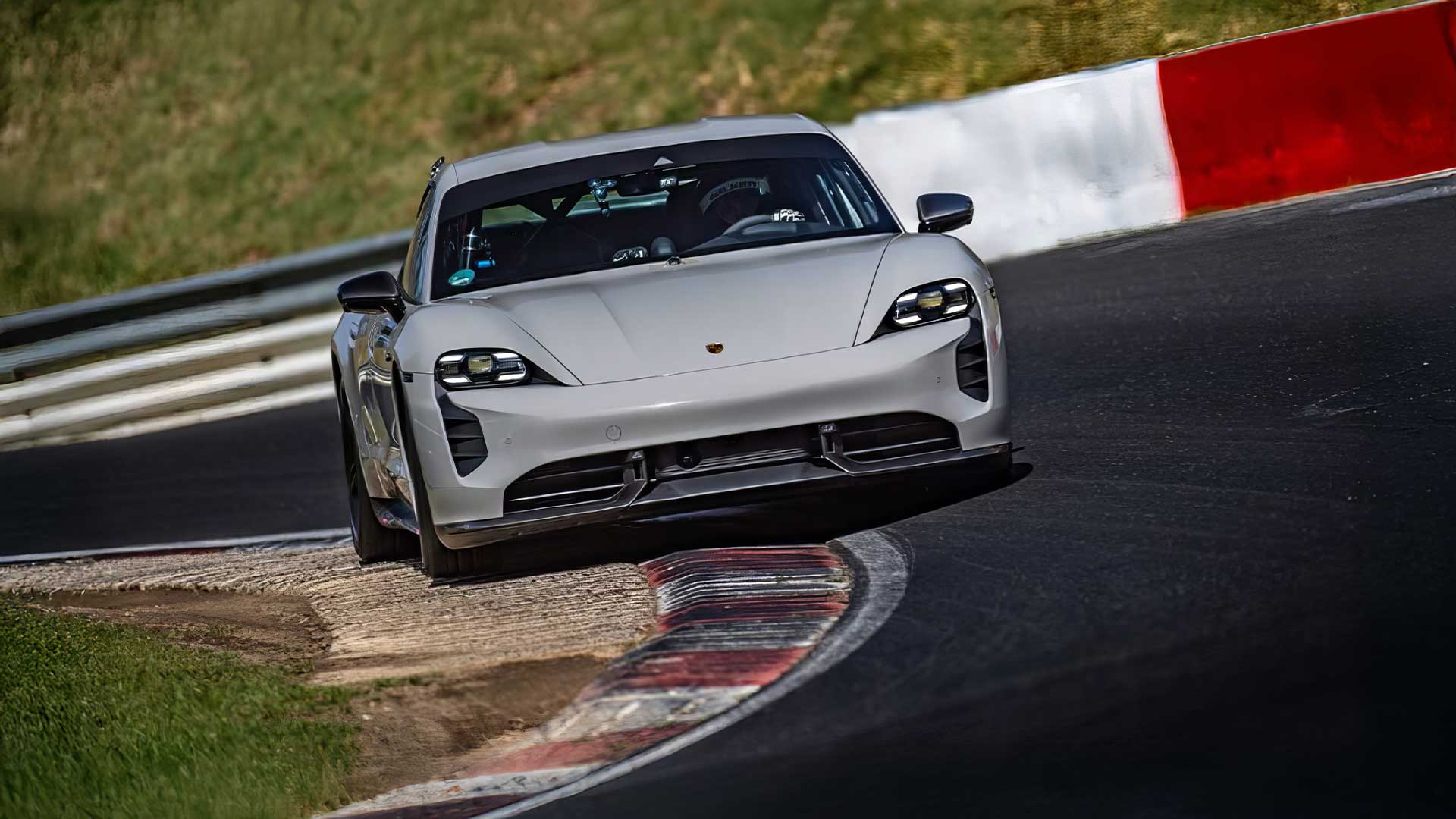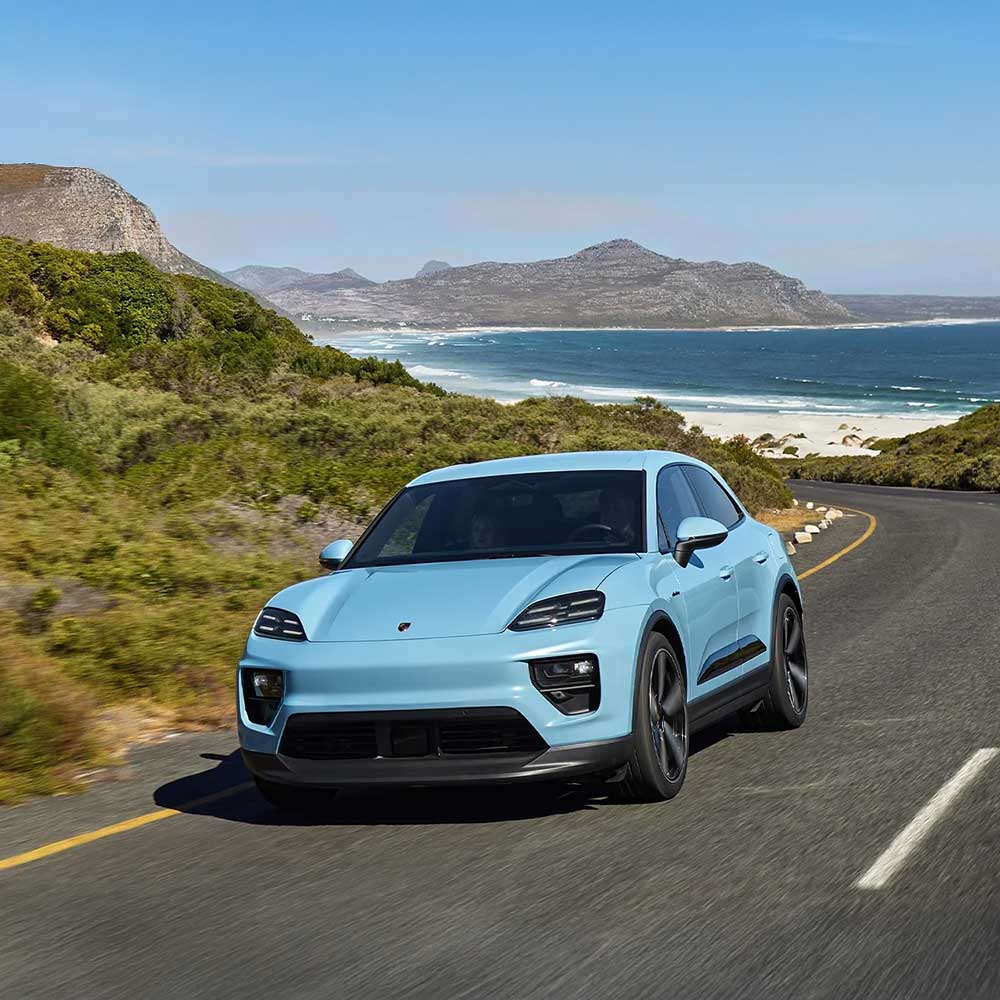What Sets Porsche’s EV Technology Apart?
Porsche Heritage + EV Technology = Overfeel
Porsche doesn’t just build cars. They engineer sensations. That indescribable tingle in your fingertips as the front end bites into a corner. The weight and response of the steering wheel. The connection between you and the road that feels more like instinct than intention. That’s what Porsche calls Overfeel. It is the foundation of every vehicle they make, electric or not.
As most automakers rush toward electrification with screen-heavy dashboards and simplified driving dynamics, Porsche has taken a different path. The company is not chasing trends. It is focused on the one thing that has defined it for generations: the driving experience.
So how do you take that feeling into the electric era? How do you transform a near-silent drivetrain into something that communicates directly with the driver? Porsche has answered that question with a lineup of EVs that still feel unmistakably like Porsche.
A Legacy of Innovation
Porsche’s electric story did not begin with the Taycan. It started in 1898 when Ferdinand Porsche designed the Egger-Lohner C.2 Phaeton – an all-electric vehicle better known as the P1. It had a range of nearly 50 miles and could reach 21 mph. That project was less about speed and more about vision, and it laid the groundwork for Porsche’s ongoing obsession with what comes next.
Over the years, Porsche quietly explored electric propulsion in racing, concept vehicles, and engineering test beds. Electrification was never just a reaction to regulations. It was part of Porsche’s natural evolution as a company that leads through engineering.

Motorsports DNA: Built to Perform, Not Just Comply
Porsche’s racing history is more than just decoration. It defines how the company builds cars. From Le Mans to Nürburgring, every lesson learned on the track finds its way into the road cars. The 919 Hybrid, which dominated the World Endurance Championship, directly influenced the development of Porsche’s 800-volt EV platform.
That technology is not just about making cars faster. It is about making them more consistent. On the road, that means cooler batteries, more predictable braking, and driving dynamics that stay sharp even after long distances. Whether you are commuting or carving through a canyon, Porsche EVs are engineered to feel the same on mile 50 as they do on mile one.

Chassis Engineering That Connects Driver and Machine
One of the core reasons Porsche EVs feel like Porsches is the way they are built. The Premium Platform Electric (PPE), which underpins the Macan EV and upcoming models, places battery mass low in the chassis and evenly distributes weight. The result is a natural, balanced feel through corners and transitions.
Combine that architecture with options like rear-axle steering, adaptive air suspension, and active dampers, and you get a level of precision that most electric vehicles cannot match. From the Macan to the Taycan Cross Turismo, the ride feels tight and composed without ever being harsh or disconnected.
Porsche understands that chassis tuning is not about stiffness. It is about communication. That philosophy continues in the EV lineup.
Brakes That Feel Like Brakes
Many EVs rely on heavy regenerative braking to maximize efficiency. In those vehicles, lifting off the throttle often slows the car dramatically without ever touching the brake pedal. While that may work for stop-and-go traffic, it is not how performance driving works.
Porsche took a different route. Their regenerative systems are present but deliberately dialed back. The mechanical brakes still do most of the work. This allows for a more natural, linear brake feel and ensures that drivers can modulate braking with accuracy and confidence.
Whether you’re on a winding road or pulling into a driveway, the experience feels familiar, responsive, and consistent.

Power That Responds With Precision
Electric torque is addictive, but in most EVs it comes all at once with little finesse. Porsche tunes its electric drivetrains to deliver acceleration that feels immediate but refined. Systems like the Taycan’s two-speed rear transmission and the Macan EV’s torque vectoring make the power more usable and controllable.
Instead of a single surge, acceleration is layered. There is a deliberate quality to how the car launches, builds speed, and holds traction. This is especially important in corners or on uneven surfaces where precise power delivery keeps the car stable and composed.
It feels fast, but more importantly, it feels right.
Interior Design That Favors the Driver
Inside a Porsche EV, nothing is accidental. The materials are tactile and durable, the seats offer real support, and the screens are placed for clarity, not distraction. Even though these cars are packed with technology, the experience remains analog at heart.
In the Taycan, Macan EV, and upcoming Cayenne EV, the driver remains the focal point. Physical controls are available where they matter. Visibility is strong. The seating position feels like it was designed by people who understand what performance driving requires.
These interiors are not just luxurious. They are functional, intuitive, and grounded in the same design values that made Porsche what it is today.
Overfeel Is Not a Feature. It Is a Philosophy.
Whether you are behind the wheel of a Taycan, a Macan, or any other Porsche EV offerings, you will notice a common thread. Each vehicle has a different shape, purpose, and personality, but they all speak the same language.
Porsche calls it Overfeel. It is the reason every steering input feels intentional, every corner feels rewarding, and every drive feels personal. The company’s EV lineup is not simply adapted for electric power. It is reimagined to preserve the soul of the Porsche driving experience.
As the Cayenne EV prepares to join the family, it will follow the same blueprint: precise suspension, refined control, and a cabin built around the driver. Porsche is not redefining itself. It is redefining what an electric vehicle can feel like.
Let HOUSE Keep Your Porsche EV Performing at Its Best
Porsche’s EVs are built with the same purpose and passion that shaped the 911. They are not rolling computers. They are high-performance machines that just happen to be electric.
At HOUSE AG, we are Porsche people through and through. Our technicians are fully-trained, indepentantly certified, and deeply familiar with the systems that power the Taycan, Macan EV, and future models. From high-voltage service to suspension diagnostics, we understand what makes these vehicles special, and how to keep them that way.
Schedule your service today and let your Porsche EV continue to deliver the feeling that only Porsche can create.
